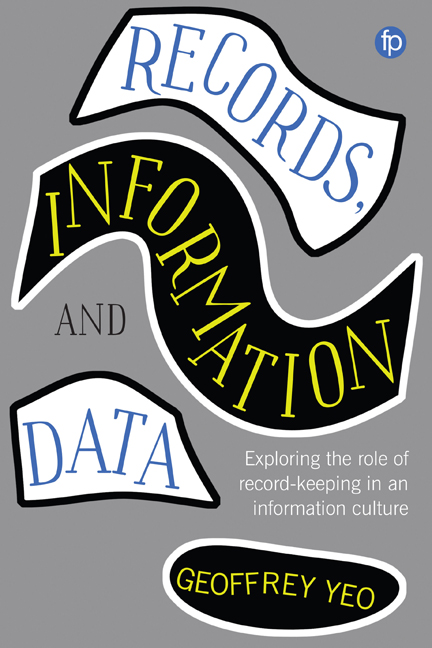Book contents
- Frontmatter
- Contents
- Introduction
- 1 The Making and Keeping of Records: a Brief Historical Overview
- 2 Thinking About Records and Archives; the Transition to the Digital
- 3 Archivists, Records Managers and the Rise of Information
- 4 Finding a Way Through the Hall of Mirrors: Concepts of Information
- 5 Records and Data
- 6 Representation, Performativity and Social Action: Why Records Are Not (Just) Information
- 7 Managing Information or Managing Records?
- Concluding Thoughts: Record-Keeping Present and Future
- Index
Introduction
Published online by Cambridge University Press: 24 September 2019
- Frontmatter
- Contents
- Introduction
- 1 The Making and Keeping of Records: a Brief Historical Overview
- 2 Thinking About Records and Archives; the Transition to the Digital
- 3 Archivists, Records Managers and the Rise of Information
- 4 Finding a Way Through the Hall of Mirrors: Concepts of Information
- 5 Records and Data
- 6 Representation, Performativity and Social Action: Why Records Are Not (Just) Information
- 7 Managing Information or Managing Records?
- Concluding Thoughts: Record-Keeping Present and Future
- Index
Summary
It is often said that we live in an information age. Our ability to deploy information creatively, we are told, makes our lives today radically different from those of our ancestors. One commentator has affirmed that we are experiencing a ‘third wave’ in the way that humans organise their affairs, and that new forms of society based on information are superseding the agricultural and industrial societies of the first and second waves (Toffler, 1980). Another commentator, using a different metaphor and a different approach to enumerating change, has described a ‘fourth revolution’ founded on information: a revolution whose achievements may alter our understandings of human existence as profoundly as the earlier ‘revolutions’ generated by the works of Copernicus, Darwin and Freud (Floridi, 2014). Although information was not always highly esteemed in the past, it is now widely perceived as ‘the stuff of human communication’, a constitutive force in society and a ‘universal principle’ at work in the world (Balnaves and Willson, 2011, 4–6, 31).
Claims such as these need not be accepted uncritically, but cannot be ignored; our contemporary environment is undoubtedly one in which information is accorded a leading role. In the sub-title of this book, I refer to this phenomenon as an ‘information culture’. Other writers have sometimes understood ‘information culture’ as the range of attitudes towards information shown by the staff of a particular organization; from this perspective, ‘an organization has a mature information culture when it … easily … uses information in its everyday activities’ (Svärd, 2017, xi). Writers who adopt this view tend to assume that information belongs in an organizational context and that the main issue to be addressed is the extent to which an organization's employees acknowledge the value of information and the benefits of using it. This book, however, challenges some of these assumptions. It suggests that notions of information as a beneficial commodity cannot simply be taken for granted, and it places ‘information culture’ at societal rather than primarily organizational level, using the term in a broadly similar way to writers such as Steven Lubar (1999) and Luke Tredinnick (2008), to refer to a contemporary culture in which leading figures in governments, universities, the computer industry and the popular media promote information as a commodity of central importance.
- Type
- Chapter
- Information
- Records, Information and DataExploring the Role of Record Keeping in an Information Culture, pp. vii - xviPublisher: FacetPrint publication year: 2018



